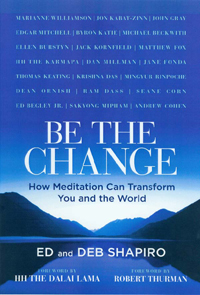
The world right now is in a complete spin. We are facing mounting problems and chaos in our own country as no one feels that they have enough: the rich want more power while everyone else just wants to survive. At the same time we have no idea what will happen next in the Middle East. All this upheaval is based on massive lies, deception, fear and greed.
When we are children we learn that to be good means never to tell a lie. We all struggle with this, are rarely able to stick to it, and invariably lie defending the fact that we lied: "I didn't do it, honest!"
If you are following any kind of religious or spiritual path, then telling the truth is usually up there with other ethical obligations. But is speaking the truth always the best thing to do, specifically when it may cause yourself and others suffering or psychological damage? Are we not also exhorted to be compassionate and wise?
As an example, there is a an old story of a monk who was meditating happily in the sun outside his cave when a beautiful but very distressed damsel came running up to him. "Help me," she cried. "There's a very bad man, a robber, who is trying to kill me. Please, let me hide in your cave." Without waiting for a reply, the girl ran into his cave and hid in the dark interior. The monk had not said a word and, although slightly perturbed, he continued to meditate. A few minutes later a wild-looking man with a patch on one eye came galloping up on a black horse. When he saw the monk, he stopped and yelled at him, "Have you seen a young woman? I must find her." Being a celibate, the monk quite calmly said to the robber, "What would I be doing with a woman?" To which the man galloped on.
The monk did not lie, nor did he honestly answer the question. However, by avoiding the truth he saved three lives: the girl's; his own, as the robber would have had to kill him for being a witness; and the robber's, who would have been killed as punishment.
Everything we think, say and do has an immediate effect on everyone around us. This means that our words and actions can lead to chaos and destruction as easily as they can lead to healing and friendship. So it would seem that sometimes avoiding the truth or maybe watering it down can be the more moral and compassionate act. A white lie can save a situation from getting badly out of hand.
With this awareness, we are able to discern between times when actions and words are either skillful or unskillful, where we are being a help or a hindrance. Skillful action brings out the best in each situation, such as harmlessness and generosity, while unskillful actions maintain and reinforce separation; they are basically harmful and self-centered. Their primary concern is protecting the "me."
The opportunities for skillful behavior are present in every moment, from dealing with someone complaining to making sure your kids get an equal amount of attention, from running a business meeting to having to negotiate a peace treaty, or from deciding when to be totally honest or fudge the truth.
In essence, truth is cool while lies are hot, and heat is anger and negativity. When we spread lies we spread heat that easily creates fire. Fire can burn down and destroy everything in its path.
But while there are bad lies that are destructive and self-centered, there are also good lies that serve to not cause harm. Discrimination is the key and meditation is the most immediate and effective way to develop this, as we see things as they truly are. When we are thoughtful and respectful then wisdom and compassion come naturally.
Have you ever told a lie that helped make a situation better? Do comment below.
***
You can receive notice of our blogs every Tuesday by clicking "Become a Fan" at the top of this page.
See our award-winning book, "Be the Change: How Meditation Can Transform You and the World," with forewords by the Dalai Lama and Robert Thurman and contributions from Marianne Williamson, Jane Fonda, Ram Dass, Byron Katie and many others.
Our three meditation CDs -- "Metta: Loving-Kindness and Forgiveness," "Samadhi: Breath Awareness and Insight" and "Yoga Nidra: Inner Conscious Relaxation" -- are available at www.EdandDebShapiro.com.
